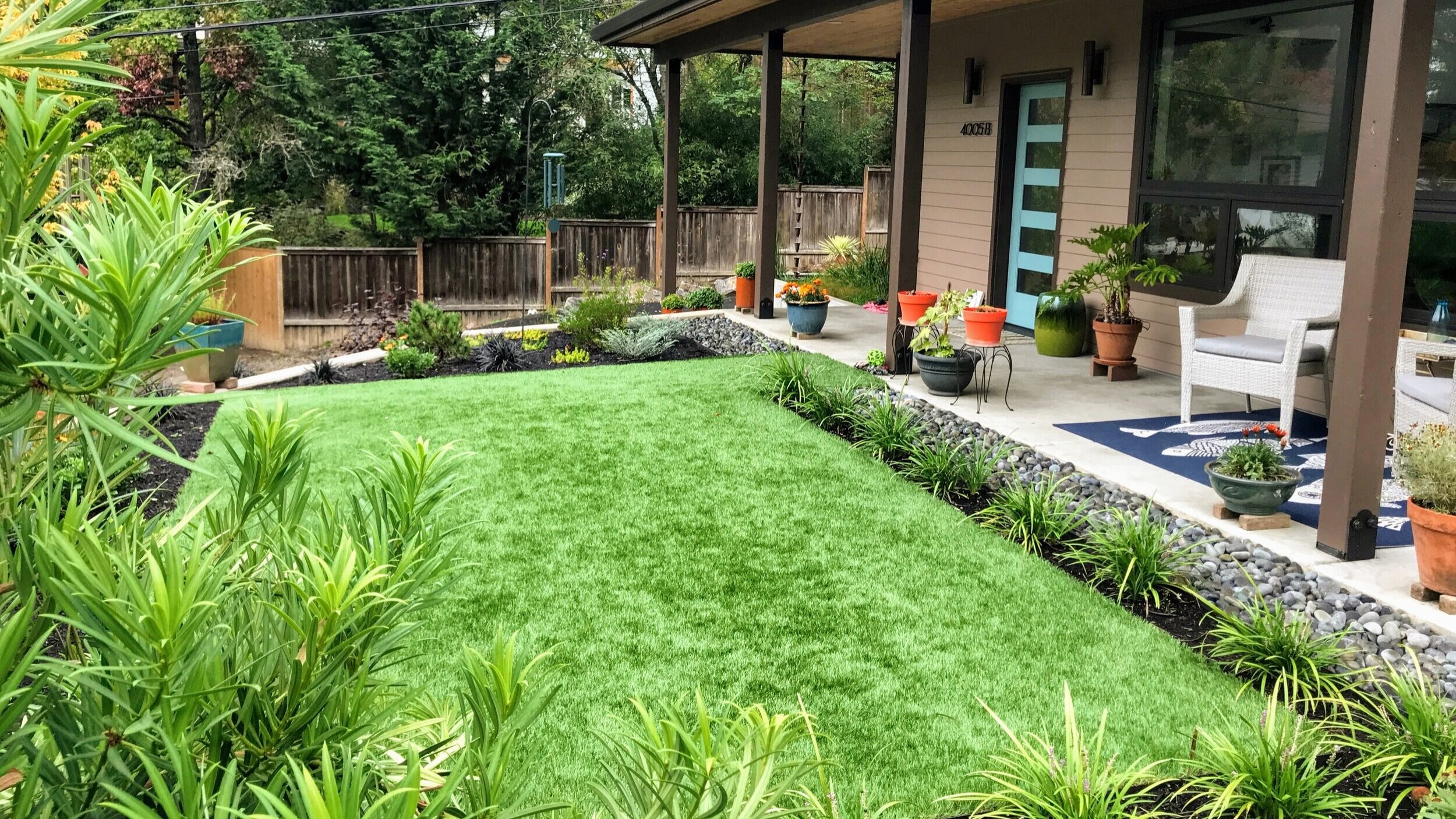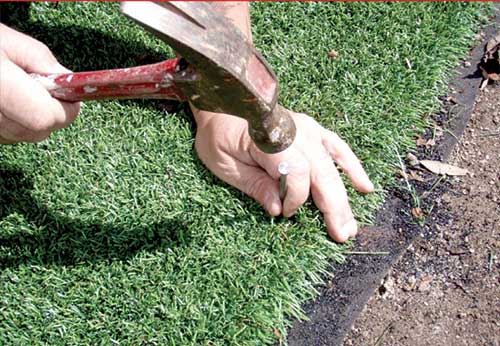Stylish Backyard Artificial Grass Canoga Park Designs for Your Home
Stylish Backyard Artificial Grass Canoga Park Designs for Your Home
Blog Article
Leading Factors to Take Into Consideration Artificial Grass for a Low-Maintenance and lush Yard
As homeowners progressively look for sustainable options for outdoor areas, artificial lawn offers an appealing option to traditional yards. The benefits expand beyond plain visual appeals and sustainability; discovering the multifaceted ramifications of artificial lawn discloses a comprehensive technique to backyard administration that qualities deeper consideration.
Year-Round Greenery
One of the most significant advantages of fabricated grass is its ability to provide year-round greenery, no matter of environment problems. Homeowners often face challenges in maintaining a vivid lawn as a result of seasonal adjustments, dry spells, or hefty rainfall. Artificial turf eliminates these concerns, ensuring a constantly lavish look throughout the year.
This synthetic alternative is crafted to hold up against varied climate circumstances, from sweltering summer heat to freezing winter season temperatures. Unlike natural yard, which may brownish or become irregular during extreme problems, synthetic grass preserves its lively color and structure, boosting the aesthetic appeal of any landscape.
Additionally, synthetic turf is immune to bugs and diseases that typically influence all-natural lawns. This strength adds to its long-lasting appeal, as there is no requirement for chemical treatments or fertilizers that can be hazardous to the setting. Additionally, homeowners can appreciate the visual advantages of a well-maintained yard without the intermittent challenges presented by natural lawn treatment (artificial grass canoga park).
Lowered Maintenance Efforts
Man-made yard considerably lowers upkeep efforts, allowing house owners to appreciate an immaculate lawn without the lengthy jobs linked with natural yard treatment. Among the most notable benefits of artificial lawn is the removal of normal mowing. Without any need for a lawnmower, home owners save both time and the price of maintenance related to this tools.

Cleaning man-made yard is uncomplicated; a basic rinse with a hose or the occasional cleaning to get rid of particles is normally enough - artificial grass. This simplicity of treatment allows property owners to invest more time enjoying their outside areas instead than struggling over them. In recap, the minimized maintenance efforts connected with synthetic yard make it an appealing choice for those seeking a beautiful, problem-free lawn
Water Preservation Conveniences
The significant reduction in maintenance efforts linked with artificial grass includes water conservation, making it an eco-friendly option for house owners. Standard grass need significant quantities of water to remain rich and dynamic, commonly causing too much water use, especially in dry regions. On the other hand, man-made grass removes the demand for routine watering, drastically reducing the general water consumption in your backyard.
By going with artificial turf, property owners can conserve thousands of gallons of water yearly. This change not only advantages specific houses however likewise contributes to more comprehensive environmental initiatives focused on reducing water waste. In locations experiencing water shortage, the adoption of synthetic turf can play a considerable role in minimizing the impacts of drought and ensuring that valuable water sources are used more successfully.
Moreover, the installment of man-made turf can aid lower metropolitan water need, visit this site right here profiting the area all at once. With growing awareness of ecological issues, choosing man-made turf functions as a proactive action towards lasting landscaping, aiding to preserve all-natural water sources while maintaining a cosmetically pleasing outside room (artificial grass installation). In recap, synthetic turf offers a compelling remedy for water conservation, lining up ecological duty with modern-day landscape design needs

Parasite and Allergic Reaction Reduction
A considerable advantage of installing synthetic turf is its capacity to lower bugs and allergens in outdoor spaces. Traditional turf lawns often work as reproducing premises for bugs such as insects, ticks, and ants, which can produce pain and health and wellness dangers for family members and pets. On the other hand, artificial lawn gets rid of the organic product that brings in these insects, thus significantly decreasing their populations in your yard.
Moreover, all-natural turf can nurture mold, plant pollen, and various other allergens, which can cause allergies and respiratory problems for sensitive people. Artificial turf supplies a cleaner atmosphere, reducing the capacity for allergenic reactions. Unlike natural grass, synthetic grass does not produce pollen, making it an excellent option for allergic reaction sufferers looking for to enjoy their read more outside spaces without the danger of flare-ups.
In addition, the absence of dirt in synthetic lawn implies there is much less dust and dust, further lessening air-borne allergens. This low-maintenance option not just boosts the visual appeal of your backyard but likewise promotes a much healthier outside setting, allowing households to appreciate their grass without the continuous fear of irritants and parasites. Thus, man-made yard is a calculated selection for those focusing on comfort and health in their outside space.
Long-Term Expense Financial Savings
Spending in synthetic turf can lead to substantial long-term cost savings for property owners. Synthetic turf eliminates the demand for regular lawn upkeep expenditures, such as mowing, feeding, and watering.
Additionally, the durability of synthetic grass even more enhances its cost-effectiveness. Most top quality artificial yard items can last 15 to 25 years with minimal upkeep, lowering the demand for replacement or comprehensive repairs. On the other hand, all-natural lawn may call for regular reseeding great post to read and regular care, which can rapidly add up in expenses.
Energy financial savings are one more important aspect. Property owners can anticipate to see lower water costs, as synthetic turf does not require watering. Additionally, the decrease in lawn treatment solutions can release up useful time and resources, enabling homeowners to allot their budgets in other places.
Final Thought
In recap, synthetic lawn presents various benefits for home owners seeking a low-maintenance and lively landscape. Its capacity to give year-round plant, paired with decreased upkeep efforts and considerable water preservation, makes it an appealing option. In addition, the reduction of irritants and insects contributes to a healthier outside atmosphere. Ultimately, the long-lasting cost financial savings related to synthetic grass solidify its status as a functional and sustainable service for improving exterior rooms.
Artificial grass considerably minimizes upkeep efforts, allowing property owners to take pleasure in a beautiful grass without the time-consuming tasks associated with all-natural yard treatment.The considerable reduction in maintenance efforts associated with artificial yard prolongs to water conservation, making it an environmentally friendly alternative for home owners. In comparison, fabricated lawn eliminates the requirement for routine watering, dramatically lowering the overall water consumption in your yard.
In locations experiencing water shortage, the fostering of man-made turf can play a significant duty in alleviating the effects of drought and ensuring that beneficial water sources are utilized extra effectively.
With growing understanding of ecological problems, choosing artificial lawn serves as a positive action in the direction of sustainable landscape design, aiding to protect all-natural water sources while preserving an aesthetically pleasing exterior area.
Report this page